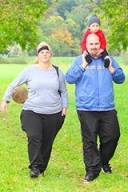Obesity & Knee Replacement
Here’s a quick multiple-choice quiz. Given the topic of the article, we’re expecting a perfect score.
Question: Which of the following is the greatest cause of the extraordinary increase in hip and knee replacement surgeries:
A. Aging Baby Boomers
B. Weekend Warrior athletes
C. Rising rates of obesity
D. Climate change
Climate change did generate cold weather for us – but is NOT the correct answer. Weekend warriors and aging Baby Boomers are driving more joint replacement surgery. However, data gathered from more than 100 Orthopedic Surgeons points to the increasing obesity rates among people under 65. (Didn’t your friends always tell you to ALWAYS pick “C”?)
“People who are obese have at least 3 strikes against them in the area of total joint replacement,” says McLeod Orthopedic Surgeon Dr. Michael Sutton of McLeod Orthopaedics Dillon. “Overweight patients face a greater likelihood of surgery, more problems and higher costs during surgery, and issues during recovery.”
GREATER LIKELIHOOD OF SURGERY
First, let’s define obese. By one measure, it’s a person whose Body Mass Index (BMI) is 30 or more. Let’s say you are 5’10”. If you weigh 210 pounds, you are considered obese. If you weigh 280, you are considered morbidly obese (BMI 40). Check your BMI at this link.
In one survey of joint replacement patients under age 60, some 77% were obese compared to only 26% of the general population. The chances of a knee replacement are 8 times higher for patients a BMI greater than 30 and 28 times higher for patients with a BMI over 35.
Obesity also results in the necessity of knee and hip replacement earlier. For hip replacements, 10 years earlier than the normal population. For knee replacements, 13 years earlier.
DURING SURGERY
During surgery, the morbidly obese patient can require special instruments to reach through the fat. Obese patients also have the danger of fat tissue ending up in the heart area, leading to arrhythmias.
Morbidly obese patients tend to experience more complications related to surgery and significantly more complications related to the wound.
Higher hospital costs are also an issue for patients with a BMI over 30, generally related to longer hospitals stays. The result is potentially $1,000 or more in your hospital bill, compared to a person of regular weight.
POST-OPERATIVE
You might think that the surgery would result in some weight loss for patients. Yet, most patients – including those already with BMI’s exceeding 30 – tend to gain body weight after surgery, even when involved in some exercise…and even when you subtract the weight the implant.
While heavier patients see improved health, less pain and more mobility after surgery, the obese generally don’t see a return of full physical function by their follow-up visit.
As a result, these patients are more likely to depend on walking aids and experience depression after surgery.
ACTION YOU CAN TAKE
Controlling your weight can help prevent or delay knee and hip replacement. It can reduce your hospital expenses and speed your recovery.
For help in controlling your weight, check the McLeod Health & Fitness Center in Florence or the Center for Health & Fitness in Loris
Sources: McLeod Health, National Institutes of Health, American Academy of Orthopaedic Surgeons. Bone & Joint Journal (UK), Journal of Orthopaedic Surgery & Research
-
McLEOD REGIONAL MEDICAL CENTER FLORENCE
843-777-2000 -
McLEOD DARLINGTON
843-777-1100 -
McLEOD DILLON
843-774-4111 -
McLEOD LORIS
843-716-7000 -
McLEOD SEACOAST
843-390-8100 -
McLEOD CHERAW
843-537-7881 -
McLEOD CLARENDON
803-433-3000



-
McLEOD REGIONAL MEDICAL CENTER FLORENCE
843-777-2000 -
McLEOD DARLINGTON
843-777-1100 -
McLEOD DILLON
843-774-4111 -
McLEOD LORIS
843-716-7000 -
McLEOD SEACOAST
843-390-8100 -
McLEOD CHERAW
843-537-7881 -
McLEOD CLARENDON
803-433-3000
 Find a Doctor
Find a Doctor  Locations
Locations  Services
Services 